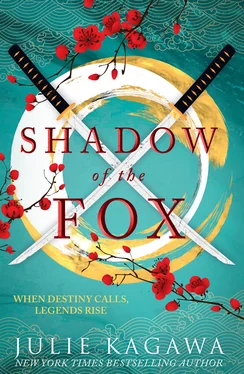But to do that, I would have to leave behind the monks, the temple and the only life I’d ever known. And while the order of the Silent Winds temple was small, confining and rigid, it was also safe. I was just one kitsune, not even a full-blooded yokai. I wasn’t quite ready to be that brave.
“I can’t leave, Tanuki-baba,” I told the hunched figure across the table. “Where would I go? How would I live?”
Tanuki-baba blinked. “What do you mean, how would you live?” she snapped. “You’re kitsune , girl! You’d go where you want. You live however you like.”
“I’m only half kitsune,” I pointed out. “And I’ve been with the monks my whole life. I don’t know how to be a fox.”
“Don’t know how to be a fox?” Tanuki-baba threw back her head and cackled. Flecks of spittle flew from her narrow jaws as she laughed, shaking her head. “Poor little kitsune,” she mocked. “You’ve lived with these humans for too long, letting their mortality infect you.” She chuckled, giving me a look of exasperation. “You are a fox . You don’t have to learn how to be kitsune. You just are.”
“But—”
“And don’t give me any excuses about your ‘human’ side.” Tanuki-baba curled a lip, showing sharp yellow teeth. “Even a drop of yokai blood is enough to suppress any hints of humanity, if you want it to. You just have to choose to be more kitsune than mortal.”
Choose to be more kitsune? How did I do that? Was there a ritual for it? I thought back to what Denga-san had said this evening, about my yokai nature overshadowing my humanity. Was that what the monks were afraid of? Did they fear I would turn into a nogitsune, an evil wild fox that delighted in fear and chaos and preyed on humans whenever it could?
I swallowed hard. “But what if I don’t want to be more kitsune?” I asked, making Tanuki-baba frown. “What if I’m happy as a human and a fox?”
She sniffed. “Then you are a fool,” she stated bluntly. “And you are fighting a losing battle. It is very hard to be human, little fox. Even the humans themselves don’t do a great job of it. The mortal world is full of hatred, betrayal, sadness and death. Most yokai and kami alike find that it is too much for them. Everything the humans think they value—love, honor, empathy, compassion—we yokai need nothing of those, especially when they so often lead to suffering and despair. It is far easier to abandon everything that is human and just be kitsune. The world of spirits and yokai is far less complicated than the world of men.”
“I don’t understand, Tanuki-baba.”
“Of course not.” Tanuki-baba shook her shaggy head, but did not elaborate. “You are a cub, with no sense of the world. But you will learn. If you continue to try to balance your two natures, you will. And in time, when you finally experience what the human world is truly like, you will decide that being a fox is much less difficult than being human.” She glanced down at the table, nostrils twitching. “But now, our teacups are empty, and the fish is gone. That means it is time for bed.”
I rose and bowed to the ancient tanuki. One did not question the habits or behaviors of yokai as old as she. “I should go home,” I said, taking a step back. “The monks will probably be waiting with a lecture. Thank you for the tea and the conversation, Tanuki-baba.”
“Fox cub,” the old yokai called as I reached the door. I glanced back to see the squat, furry creature sitting in the squalor of her house, watching me with eyes that glowed yellow in the shadows. “You walk a thin line, little kitsune,” she said, and her voice was a warning, though I didn’t know from what. “The place between the spirit realm and the mortal realm is a difficult one, indeed. Remember, you can always give up your humanity if things become too hard. It is far easier for a kitsune, even a half kitsune, to abandon it than one who is fully mortal.”
I still didn’t know what she meant by that, so I simply nodded and left, slipping into the dim quiet of the woods.
Immediately, I knew something was wrong.
In the time I had spent in Tanuki-baba’s home, night had fallen, and the forest had gone deathly still. Instead of birdsong or the rustle of small creatures scampering through the undergrowth, an ominous silence hung in the air. The forest kami had vanished like they’d never been, leaving empty, lifeless woods behind. And a new scent was creeping through the trees, raising the hairs on the back of my neck. The sharp, acrid scent of smoke.
I sprinted through the forest, retracing my steps past the hollow, the stream and the bamboo grove, until I reached the pond. The green-and-silver wall opened up, showing the night sky with a faded crescent moon overhead and a smear of crimson sinking into the west.
My heart twisted. A dark smudge was rising over the tree line, coiling and ominous, like a terrible black dragon. It snaked into the air, blotting out the stars, coming from the direction of...
“Home.”
5
Demons in the Bamboo
I was close.
Even on horseback, it had taken me several days to reach Earth Clan territory and the Niwaki Mountains where the Silent Winds temple was said to be located. The tiny farming community in the valley below the forested peaks stared at me, wide-eyed, as I rode past terraced fields and thatched huts, following the path that snaked toward the mountains. A pair of small children trailed behind my horse, palpably curious and getting steadily closer, until they were snatched away by worried-looking adults. Traveling samurai were likely rare to this part of the valley, members of the Shadow Clan even more so, and farmers naturally gave the warrior class a wide berth. For this mission, I was dressed in the part of a Kage samurai, in hakama trousers and a black haori jacket, the crest of the Shadow Clan on my back. My shinobi gear was tucked into the saddlebags of my horse in case I needed it, though a shadow warrior never revealed himself to outsiders. If I was denied entry at the gates, I would slip over the walls and infiltrate the temple as silently as a yurei ghost, but for now, I was a samurai on a warrior’s pilgrimage, seeking wisdom at the shrines across Iwagoto.
A thin farmer wearing a ragged tunic and a cloth tied around his forehead bowed low as I passed, dropping his gaze to the dirt. I pulled the horse to a stop and glanced down at him, or rather, at the top of his bald head.
“Is the Silent Winds temple nearby?” I asked softly. The man didn’t look up, only bobbed once at the waist, his eyes on his sandaled feet as he replied.
“ H-hai , my lord! The temple is right up this path, at the top of the mountain.”
“Thank you.”
I gave the horse a nudge and continued on, leaving the farmers and the village behind. The path became a narrow, twisting trail that grew more treacherous the farther it wound through the forest. I surmised that the monks of this temple rarely received, or encouraged, visitors. Perhaps they simply wished to meditate and study in peace, far removed from the chaos of the world, or perhaps they were hiding—protecting—something.
As night fell and the shadows grew long, the trail nearly vanished, melting into the brush and thick undergrowth, as if the forest itself took offense to intruders. But I had been trained to spot the hidden and the invisible, and darkness was no hindrance for me. I continued, passing bamboo groves and huge trees strung with sacred rope, signifying they were home to the kami.
In my head, Hakaimono stirred. I pulled the horse to a stop and sat, motionless, trying to hear past the labored breaths of the animal beneath me. Around us, the woods were silent and still, evening shadows cloaking all but a few spots of mottled red sunlight.
Читать дальше












